New Challenges and Developments in Swedish Social Policy
VerifiedAdded on 2022/09/08
|7
|1462
|27
Report
AI Summary
This report provides a comprehensive analysis of Swedish social policy, covering its historical development, current challenges, and future prospects. It begins by examining the universal factors and welfare services in Sweden, including the 'institutional' and 'residual' welfares, and the role of healthcare. The report then delves into Esping-Andersen's regime typology, focusing on the social-democratic model and its implications, as well as the different social policies implemented in Sweden, such as education, social inclusion, health, and pensions. It further explores the impact of neoliberal policies, including privatization and changes in eligibility, and the rise of New Public Management. The report also highlights the Nordic countries' focus on equality and developmental changes, particularly in education and financial stability. Finally, it discusses the challenges faced by Sweden, including environmental issues and financial disparities, and the strategies employed to address them, such as improving literacy rates and financial stability. The assignment is based on the provided lecture outlines and readings on the Swedish welfare state and social policy, including topics like the historical development of the Swedish model, regime theory, and the impact of neoliberalism.
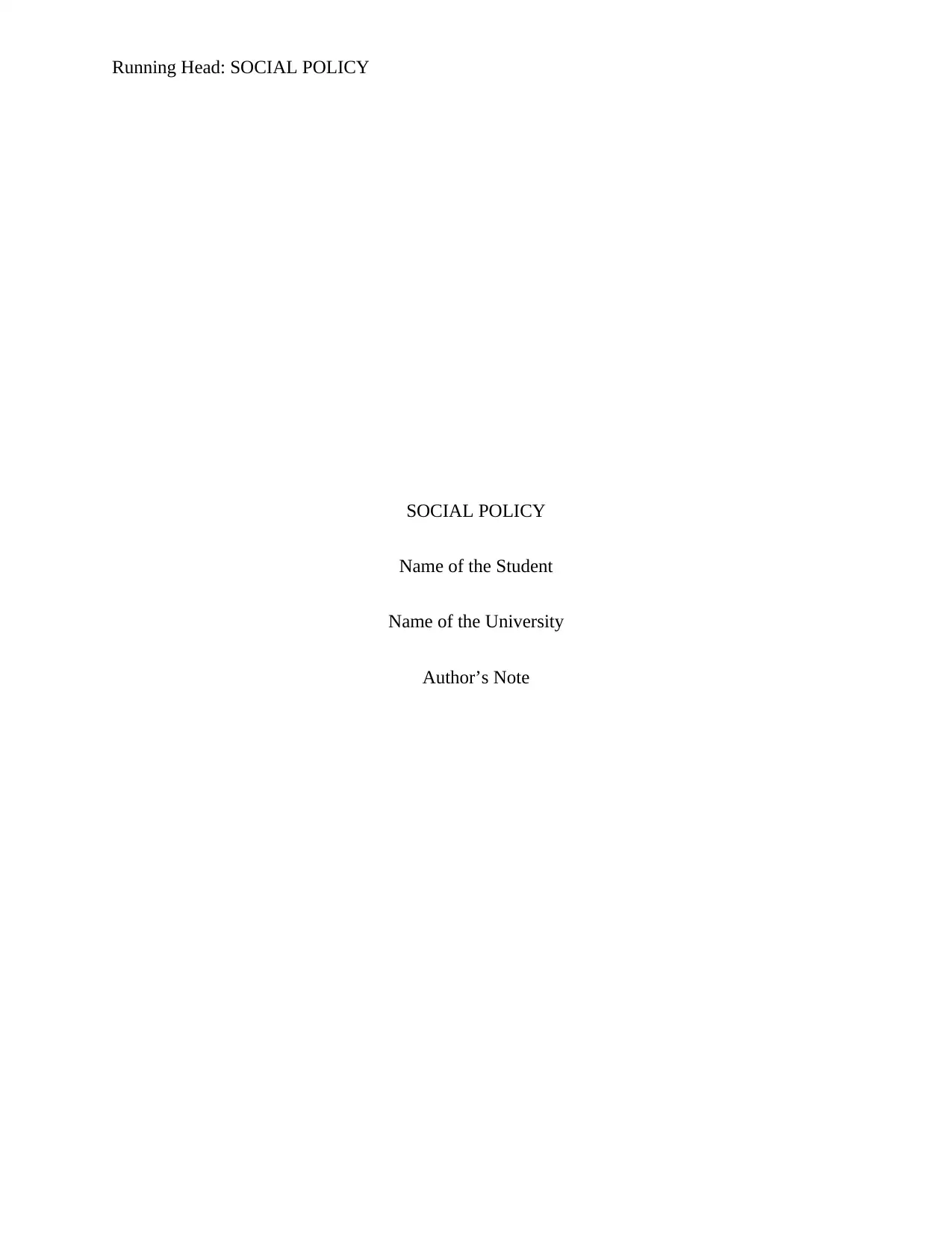
Running Head: SOCIAL POLICY
SOCIAL POLICY
Name of the Student
Name of the University
Author’s Note
SOCIAL POLICY
Name of the Student
Name of the University
Author’s Note
Paraphrase This Document
Need a fresh take? Get an instant paraphrase of this document with our AI Paraphraser
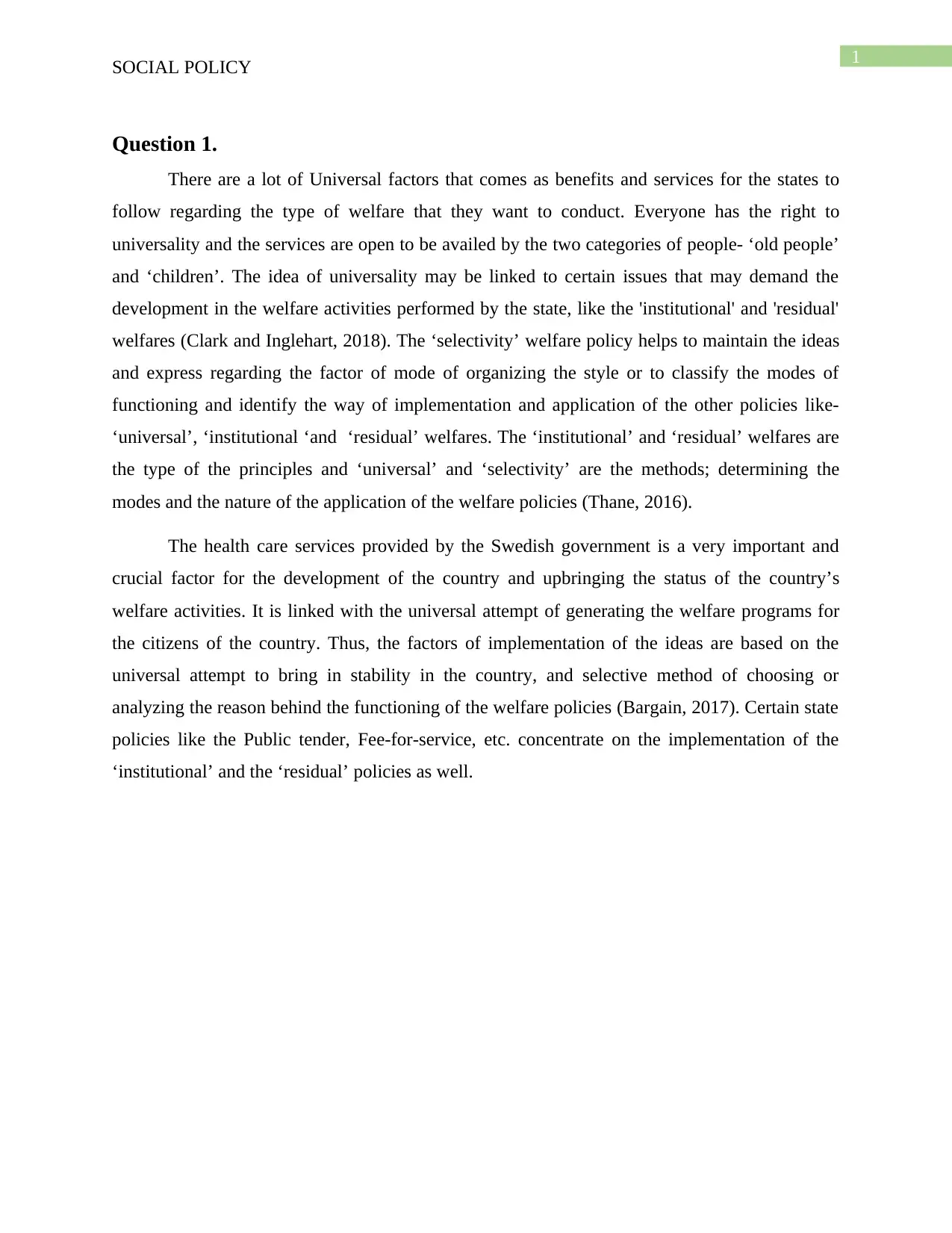
1
SOCIAL POLICY
Question 1.
There are a lot of Universal factors that comes as benefits and services for the states to
follow regarding the type of welfare that they want to conduct. Everyone has the right to
universality and the services are open to be availed by the two categories of people- ‘old people’
and ‘children’. The idea of universality may be linked to certain issues that may demand the
development in the welfare activities performed by the state, like the 'institutional' and 'residual'
welfares (Clark and Inglehart, 2018). The ‘selectivity’ welfare policy helps to maintain the ideas
and express regarding the factor of mode of organizing the style or to classify the modes of
functioning and identify the way of implementation and application of the other policies like-
‘universal’, ‘institutional ‘and ‘residual’ welfares. The ‘institutional’ and ‘residual’ welfares are
the type of the principles and ‘universal’ and ‘selectivity’ are the methods; determining the
modes and the nature of the application of the welfare policies (Thane, 2016).
The health care services provided by the Swedish government is a very important and
crucial factor for the development of the country and upbringing the status of the country’s
welfare activities. It is linked with the universal attempt of generating the welfare programs for
the citizens of the country. Thus, the factors of implementation of the ideas are based on the
universal attempt to bring in stability in the country, and selective method of choosing or
analyzing the reason behind the functioning of the welfare policies (Bargain, 2017). Certain state
policies like the Public tender, Fee-for-service, etc. concentrate on the implementation of the
‘institutional’ and the ‘residual’ policies as well.
SOCIAL POLICY
Question 1.
There are a lot of Universal factors that comes as benefits and services for the states to
follow regarding the type of welfare that they want to conduct. Everyone has the right to
universality and the services are open to be availed by the two categories of people- ‘old people’
and ‘children’. The idea of universality may be linked to certain issues that may demand the
development in the welfare activities performed by the state, like the 'institutional' and 'residual'
welfares (Clark and Inglehart, 2018). The ‘selectivity’ welfare policy helps to maintain the ideas
and express regarding the factor of mode of organizing the style or to classify the modes of
functioning and identify the way of implementation and application of the other policies like-
‘universal’, ‘institutional ‘and ‘residual’ welfares. The ‘institutional’ and ‘residual’ welfares are
the type of the principles and ‘universal’ and ‘selectivity’ are the methods; determining the
modes and the nature of the application of the welfare policies (Thane, 2016).
The health care services provided by the Swedish government is a very important and
crucial factor for the development of the country and upbringing the status of the country’s
welfare activities. It is linked with the universal attempt of generating the welfare programs for
the citizens of the country. Thus, the factors of implementation of the ideas are based on the
universal attempt to bring in stability in the country, and selective method of choosing or
analyzing the reason behind the functioning of the welfare policies (Bargain, 2017). Certain state
policies like the Public tender, Fee-for-service, etc. concentrate on the implementation of the
‘institutional’ and the ‘residual’ policies as well.
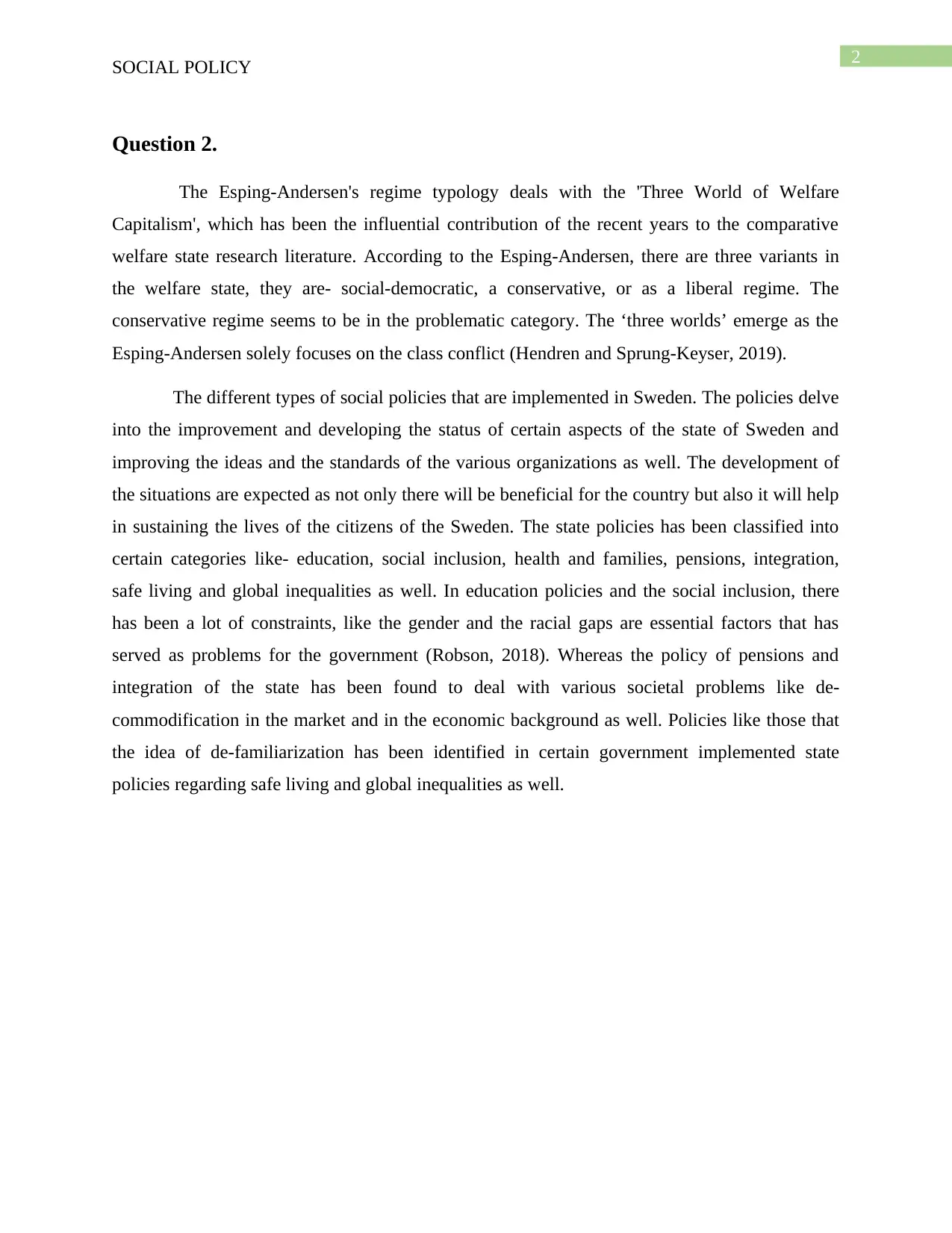
2
SOCIAL POLICY
Question 2.
The Esping-Andersen's regime typology deals with the 'Three World of Welfare
Capitalism', which has been the influential contribution of the recent years to the comparative
welfare state research literature. According to the Esping-Andersen, there are three variants in
the welfare state, they are- social-democratic, a conservative, or as a liberal regime. The
conservative regime seems to be in the problematic category. The ‘three worlds’ emerge as the
Esping-Andersen solely focuses on the class conflict (Hendren and Sprung-Keyser, 2019).
The different types of social policies that are implemented in Sweden. The policies delve
into the improvement and developing the status of certain aspects of the state of Sweden and
improving the ideas and the standards of the various organizations as well. The development of
the situations are expected as not only there will be beneficial for the country but also it will help
in sustaining the lives of the citizens of the Sweden. The state policies has been classified into
certain categories like- education, social inclusion, health and families, pensions, integration,
safe living and global inequalities as well. In education policies and the social inclusion, there
has been a lot of constraints, like the gender and the racial gaps are essential factors that has
served as problems for the government (Robson, 2018). Whereas the policy of pensions and
integration of the state has been found to deal with various societal problems like de-
commodification in the market and in the economic background as well. Policies like those that
the idea of de-familiarization has been identified in certain government implemented state
policies regarding safe living and global inequalities as well.
SOCIAL POLICY
Question 2.
The Esping-Andersen's regime typology deals with the 'Three World of Welfare
Capitalism', which has been the influential contribution of the recent years to the comparative
welfare state research literature. According to the Esping-Andersen, there are three variants in
the welfare state, they are- social-democratic, a conservative, or as a liberal regime. The
conservative regime seems to be in the problematic category. The ‘three worlds’ emerge as the
Esping-Andersen solely focuses on the class conflict (Hendren and Sprung-Keyser, 2019).
The different types of social policies that are implemented in Sweden. The policies delve
into the improvement and developing the status of certain aspects of the state of Sweden and
improving the ideas and the standards of the various organizations as well. The development of
the situations are expected as not only there will be beneficial for the country but also it will help
in sustaining the lives of the citizens of the Sweden. The state policies has been classified into
certain categories like- education, social inclusion, health and families, pensions, integration,
safe living and global inequalities as well. In education policies and the social inclusion, there
has been a lot of constraints, like the gender and the racial gaps are essential factors that has
served as problems for the government (Robson, 2018). Whereas the policy of pensions and
integration of the state has been found to deal with various societal problems like de-
commodification in the market and in the economic background as well. Policies like those that
the idea of de-familiarization has been identified in certain government implemented state
policies regarding safe living and global inequalities as well.
⊘ This is a preview!⊘
Do you want full access?
Subscribe today to unlock all pages.

Trusted by 1+ million students worldwide
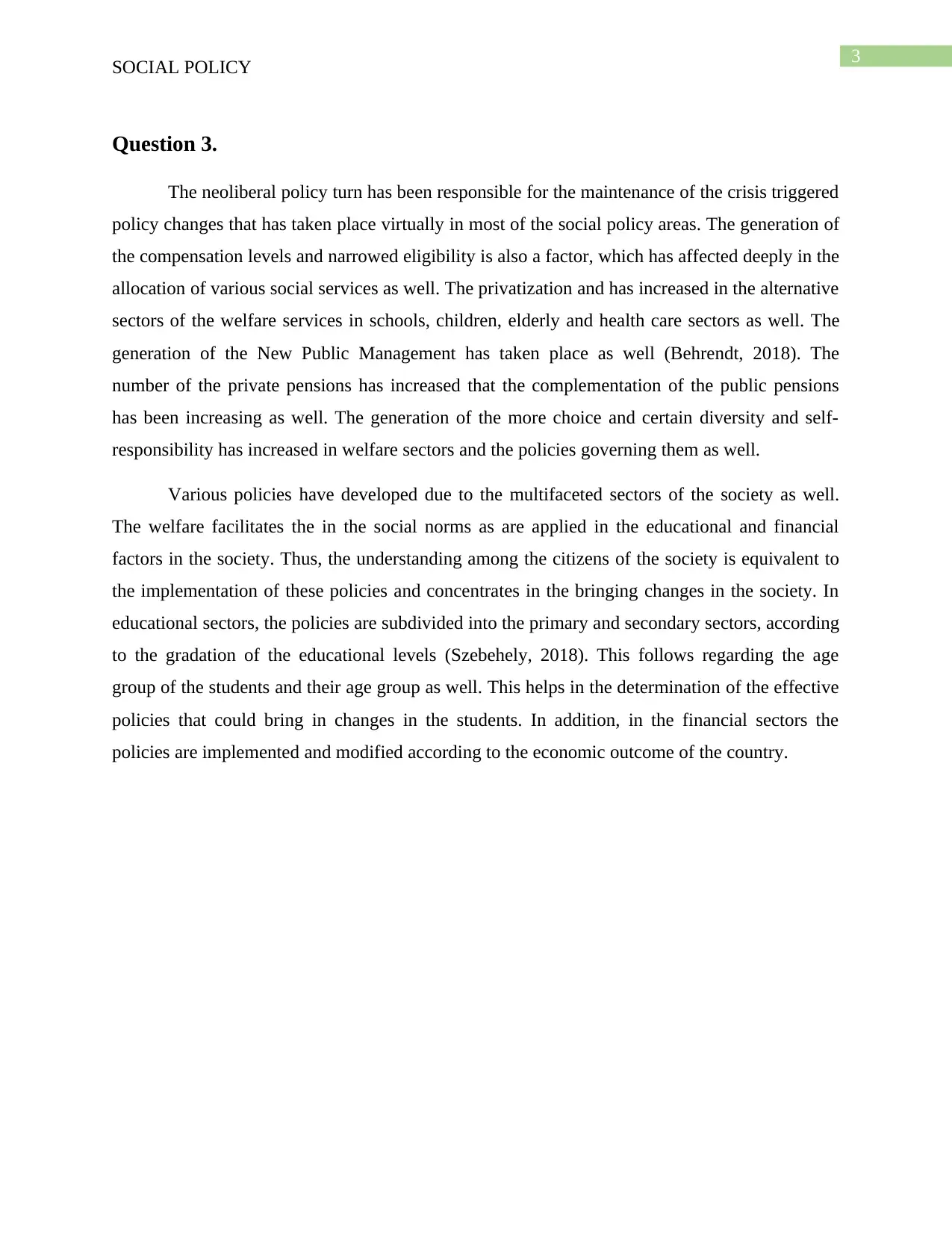
3
SOCIAL POLICY
Question 3.
The neoliberal policy turn has been responsible for the maintenance of the crisis triggered
policy changes that has taken place virtually in most of the social policy areas. The generation of
the compensation levels and narrowed eligibility is also a factor, which has affected deeply in the
allocation of various social services as well. The privatization and has increased in the alternative
sectors of the welfare services in schools, children, elderly and health care sectors as well. The
generation of the New Public Management has taken place as well (Behrendt, 2018). The
number of the private pensions has increased that the complementation of the public pensions
has been increasing as well. The generation of the more choice and certain diversity and self-
responsibility has increased in welfare sectors and the policies governing them as well.
Various policies have developed due to the multifaceted sectors of the society as well.
The welfare facilitates the in the social norms as are applied in the educational and financial
factors in the society. Thus, the understanding among the citizens of the society is equivalent to
the implementation of these policies and concentrates in the bringing changes in the society. In
educational sectors, the policies are subdivided into the primary and secondary sectors, according
to the gradation of the educational levels (Szebehely, 2018). This follows regarding the age
group of the students and their age group as well. This helps in the determination of the effective
policies that could bring in changes in the students. In addition, in the financial sectors the
policies are implemented and modified according to the economic outcome of the country.
SOCIAL POLICY
Question 3.
The neoliberal policy turn has been responsible for the maintenance of the crisis triggered
policy changes that has taken place virtually in most of the social policy areas. The generation of
the compensation levels and narrowed eligibility is also a factor, which has affected deeply in the
allocation of various social services as well. The privatization and has increased in the alternative
sectors of the welfare services in schools, children, elderly and health care sectors as well. The
generation of the New Public Management has taken place as well (Behrendt, 2018). The
number of the private pensions has increased that the complementation of the public pensions
has been increasing as well. The generation of the more choice and certain diversity and self-
responsibility has increased in welfare sectors and the policies governing them as well.
Various policies have developed due to the multifaceted sectors of the society as well.
The welfare facilitates the in the social norms as are applied in the educational and financial
factors in the society. Thus, the understanding among the citizens of the society is equivalent to
the implementation of these policies and concentrates in the bringing changes in the society. In
educational sectors, the policies are subdivided into the primary and secondary sectors, according
to the gradation of the educational levels (Szebehely, 2018). This follows regarding the age
group of the students and their age group as well. This helps in the determination of the effective
policies that could bring in changes in the students. In addition, in the financial sectors the
policies are implemented and modified according to the economic outcome of the country.
Paraphrase This Document
Need a fresh take? Get an instant paraphrase of this document with our AI Paraphraser
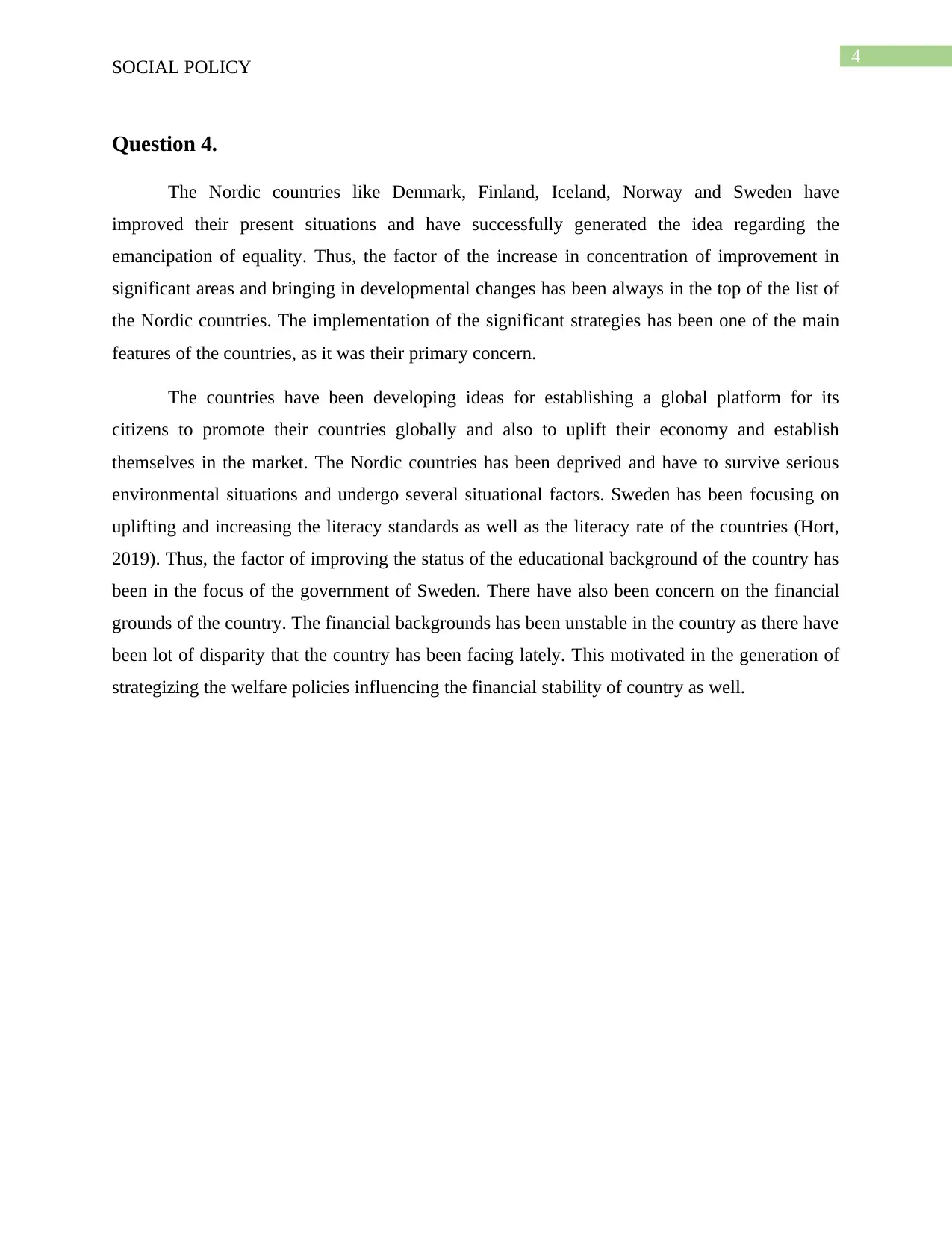
4
SOCIAL POLICY
Question 4.
The Nordic countries like Denmark, Finland, Iceland, Norway and Sweden have
improved their present situations and have successfully generated the idea regarding the
emancipation of equality. Thus, the factor of the increase in concentration of improvement in
significant areas and bringing in developmental changes has been always in the top of the list of
the Nordic countries. The implementation of the significant strategies has been one of the main
features of the countries, as it was their primary concern.
The countries have been developing ideas for establishing a global platform for its
citizens to promote their countries globally and also to uplift their economy and establish
themselves in the market. The Nordic countries has been deprived and have to survive serious
environmental situations and undergo several situational factors. Sweden has been focusing on
uplifting and increasing the literacy standards as well as the literacy rate of the countries (Hort,
2019). Thus, the factor of improving the status of the educational background of the country has
been in the focus of the government of Sweden. There have also been concern on the financial
grounds of the country. The financial backgrounds has been unstable in the country as there have
been lot of disparity that the country has been facing lately. This motivated in the generation of
strategizing the welfare policies influencing the financial stability of country as well.
SOCIAL POLICY
Question 4.
The Nordic countries like Denmark, Finland, Iceland, Norway and Sweden have
improved their present situations and have successfully generated the idea regarding the
emancipation of equality. Thus, the factor of the increase in concentration of improvement in
significant areas and bringing in developmental changes has been always in the top of the list of
the Nordic countries. The implementation of the significant strategies has been one of the main
features of the countries, as it was their primary concern.
The countries have been developing ideas for establishing a global platform for its
citizens to promote their countries globally and also to uplift their economy and establish
themselves in the market. The Nordic countries has been deprived and have to survive serious
environmental situations and undergo several situational factors. Sweden has been focusing on
uplifting and increasing the literacy standards as well as the literacy rate of the countries (Hort,
2019). Thus, the factor of improving the status of the educational background of the country has
been in the focus of the government of Sweden. There have also been concern on the financial
grounds of the country. The financial backgrounds has been unstable in the country as there have
been lot of disparity that the country has been facing lately. This motivated in the generation of
strategizing the welfare policies influencing the financial stability of country as well.
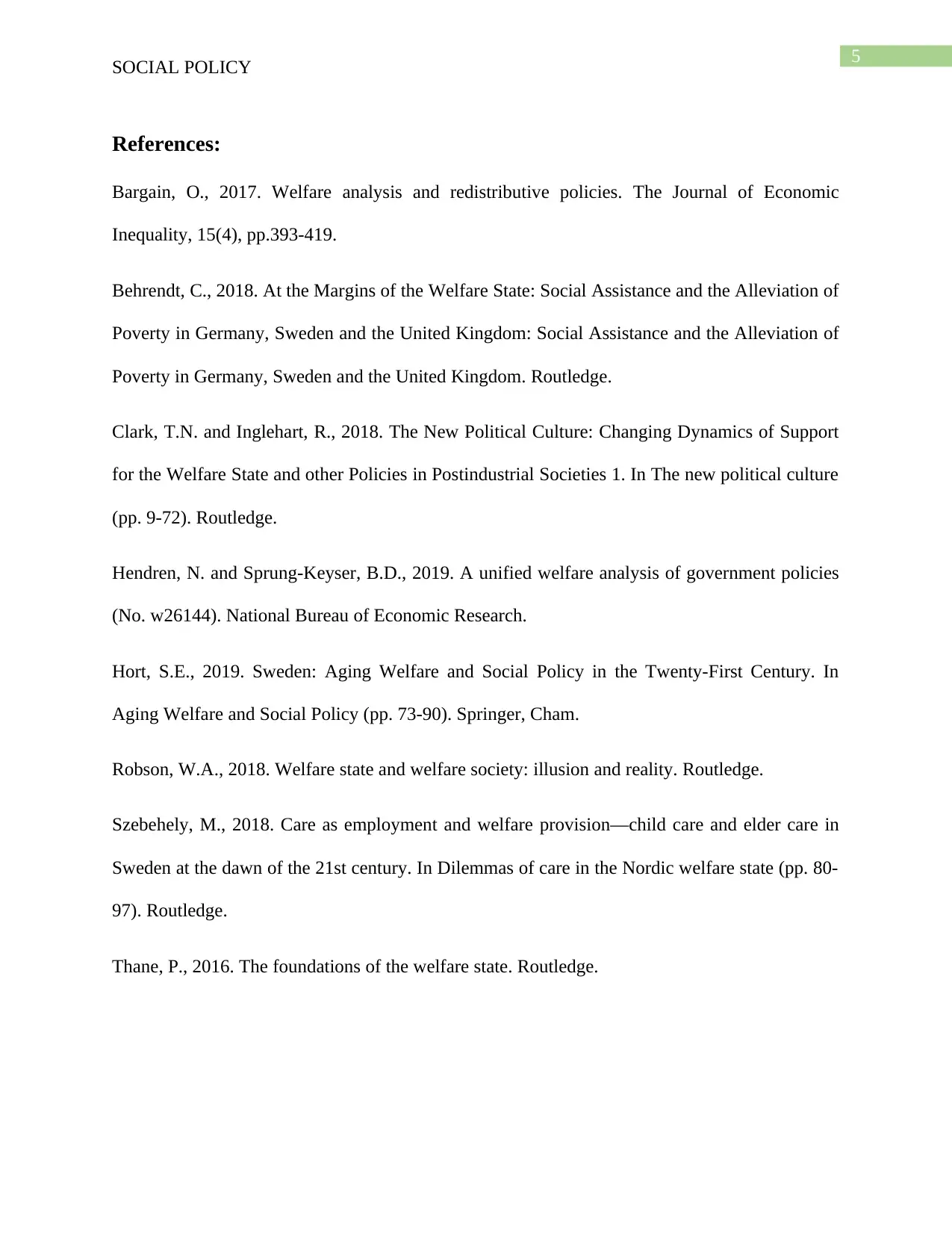
5
SOCIAL POLICY
References:
Bargain, O., 2017. Welfare analysis and redistributive policies. The Journal of Economic
Inequality, 15(4), pp.393-419.
Behrendt, C., 2018. At the Margins of the Welfare State: Social Assistance and the Alleviation of
Poverty in Germany, Sweden and the United Kingdom: Social Assistance and the Alleviation of
Poverty in Germany, Sweden and the United Kingdom. Routledge.
Clark, T.N. and Inglehart, R., 2018. The New Political Culture: Changing Dynamics of Support
for the Welfare State and other Policies in Postindustrial Societies 1. In The new political culture
(pp. 9-72). Routledge.
Hendren, N. and Sprung-Keyser, B.D., 2019. A unified welfare analysis of government policies
(No. w26144). National Bureau of Economic Research.
Hort, S.E., 2019. Sweden: Aging Welfare and Social Policy in the Twenty-First Century. In
Aging Welfare and Social Policy (pp. 73-90). Springer, Cham.
Robson, W.A., 2018. Welfare state and welfare society: illusion and reality. Routledge.
Szebehely, M., 2018. Care as employment and welfare provision—child care and elder care in
Sweden at the dawn of the 21st century. In Dilemmas of care in the Nordic welfare state (pp. 80-
97). Routledge.
Thane, P., 2016. The foundations of the welfare state. Routledge.
SOCIAL POLICY
References:
Bargain, O., 2017. Welfare analysis and redistributive policies. The Journal of Economic
Inequality, 15(4), pp.393-419.
Behrendt, C., 2018. At the Margins of the Welfare State: Social Assistance and the Alleviation of
Poverty in Germany, Sweden and the United Kingdom: Social Assistance and the Alleviation of
Poverty in Germany, Sweden and the United Kingdom. Routledge.
Clark, T.N. and Inglehart, R., 2018. The New Political Culture: Changing Dynamics of Support
for the Welfare State and other Policies in Postindustrial Societies 1. In The new political culture
(pp. 9-72). Routledge.
Hendren, N. and Sprung-Keyser, B.D., 2019. A unified welfare analysis of government policies
(No. w26144). National Bureau of Economic Research.
Hort, S.E., 2019. Sweden: Aging Welfare and Social Policy in the Twenty-First Century. In
Aging Welfare and Social Policy (pp. 73-90). Springer, Cham.
Robson, W.A., 2018. Welfare state and welfare society: illusion and reality. Routledge.
Szebehely, M., 2018. Care as employment and welfare provision—child care and elder care in
Sweden at the dawn of the 21st century. In Dilemmas of care in the Nordic welfare state (pp. 80-
97). Routledge.
Thane, P., 2016. The foundations of the welfare state. Routledge.
⊘ This is a preview!⊘
Do you want full access?
Subscribe today to unlock all pages.

Trusted by 1+ million students worldwide

6
SOCIAL POLICY
SOCIAL POLICY
1 out of 7
Related Documents
Your All-in-One AI-Powered Toolkit for Academic Success.
+13062052269
info@desklib.com
Available 24*7 on WhatsApp / Email
![[object Object]](/_next/static/media/star-bottom.7253800d.svg)
Unlock your academic potential
Copyright © 2020–2025 A2Z Services. All Rights Reserved. Developed and managed by ZUCOL.





